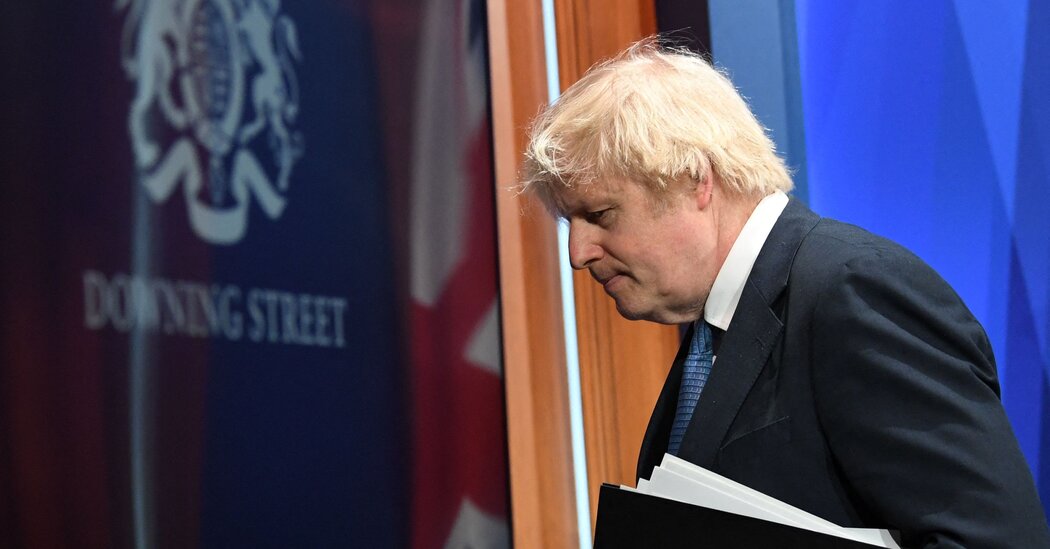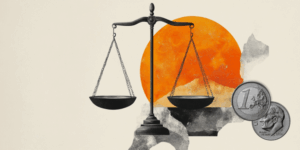https://news.google.com/__i/rss/rd/articles/CBMiSmh0dHBzOi8vd3d3Lm55dGltZXMuY29tL2xpdmUvMjAyMi8wNy8wNS93b3JsZC9qb2huc29uLWNhYmluZXQtcmVzaWduYXRpb25z0gFTaHR0cHM6Ly93d3cubnl0aW1lcy5jb20vbGl2ZS8yMDIyLzA3LzA1L3dvcmxkL2pvaG5zb24tY2FiaW5ldC1yZXNpZ25hdGlvbnMuYW1wLmh0bWw?oc=5
Image
Prime Minister Boris Johnson of Britain was battling for his political survival Tuesday night after the bombshell resignations of two of his top cabinet officers. The resignations appeared to be a coordinated move against the Conservative Party leader amid the latest in a long string of scandals.
Rishi Sunak, the chancellor of the Exchequer, and Sajid Javid, the health secretary, both quit over a fresh scandal that once again raised questions about Mr. Johnson’s judgment and honesty.
The latest crisis centers on a Conservative lawmaker who was a minister in Mr. Johnson’s government, Chris Pincher. Last week, Mr. Pincher quit his government post after a drunken night during which he is accused of having groped two men. Later it emerged that there had been similar previous allegations against him.
For days, the government insisted that Mr. Johnson had no knowledge of any prior accusations when he appointed Mr. Pincher.
Then on Monday, Downing Street acknowledged that the prime minister had known of one accusation, from Mr. Pincher’s days at the Foreign Office, but said there had been no formal complaint against him. It was then revealed that there had, in fact, been a formal complaint — and it was reported that Mr. Johnson knew about it.
On Tuesday, the former top civil servant in the Foreign Office, Sir Simon McDonald, publicly accused the government of repeatedly distorting the truth.
Mr. Johnson apologized Tuesday for appointing Mr. Pincher, saying he “bitterly regrets” it. Mr. Sunak’s and Mr. Javid’s resignations came shortly afterward, thrusting Mr. Johnson into what could be the most perilous position of his three-year tenure as prime minister.
Just a month ago, following a series of unrelated scandals, he survived a no-confidence vote by his fellow Conservative lawmakers, but whatever breathing room that gave him is waning fast.
Because Mr. Johnson survived that vote, Conservative members of Parliament cannot call another for a year, unless the party’s rules are changed. That means that pressure to resign from within his own government — including cabinet resignations like those on Tuesday — could be the only effective method of forcing him out.
Mr. Johnson moved quickly to try to blunt the impact of the resignations, appointing Steve Barclay, who has held several government positions, to replace Mr. Javid as health secretary.
Mr. Johnson’s fate may rest on whether other members of his cabinet stand by him. Although a number of senior ministers are known to be loyal to the prime minister, there was doubt about some others, and their words and actions will be watched closely.
Whether or not the cabinet stays loyal, Mr. Johnson faces an uphill battle to restore his battered authority. Even before the resignations Tuesday, Conservative lawmakers were speculating about changing party rules to allow a fresh no-confidence vote before the summer recess.
So far, Mr. Johnson has refused calls for his resignation.
In a BBC interview on Tuesday, he acknowledged that it had been “a mistake” to make Mr. Pincher deputy chief whip given previous complaints about his conduct. “With hindsight it is the wrong thing to do, and I apologize to everyone who has been badly affected by it,” Mr. Johnson said.
The story has echoes of the revelation of alcohol-fueled parties at Downing Street that violated the government’s own Covid lockdown rules. Mr. Johnson and his allies responded with denials, changing stories and finally apologies and promises of better conduct.
Mr. Javid, in his resignation statement, said that he could “no longer, in good conscience, continue serving in this government.”
In his own statement, Mr. Sunak said: “The public rightly expect government to be conducted properly, competently and seriously. I recognize this may be my last ministerial job, but I believe these standards are worth fighting for, and that is why I am resigning.”
Image
LONDON — Prime Minister Boris Johnson has survived scandals and setbacks that would have sunk many other politicians, in part because he maintained the support of his cabinet. But that changed in dramatic fashion on Tuesday evening.
Two senior ministers — the chancellor of the Exchequer, Rishi Sunak, and the health secretary, Sajid Javid — submitted their resignations after the prime minister apologized for the latest in a series of scandals that have engulfed his government. Their departure opens a huge fissure at a time when Mr. Johnson was already battling a mutiny within his Conservative Party after months of uproar over Downing Street parties that violated coronavirus lockdown rules.
Several analysts said the impact of those resignations was likely to shatter whatever support Mr. Johnson still had in the party. While the mechanics of forcing him out of office are complicated — and Mr. Johnson has yet to show any indication that he is willing to bow out on his own — the dynamics just got much harder for him.
“Javid and Sunak going together punches a far bigger hole in the cabinet than would’ve been the case had it just been one or the other,” said Tim Bale, a professor of politics at Queen Mary University of London. “I can’t see a way he gets through this. It really does look like the end of the road this time.”
Senior Conservative lawmakers also said that the departure of Mr. Sunak and Mr. Javid would deal a fatal blow to Mr. Johnson. Both are major figures in the party, with their own potential leadership aspirations, though Mr. Sunak’s star has dimmed in recent months because of questions about his wealthy wife’s tax status.
One reason the cabinet’s support is important for Mr. Johnson is that it has prevented a major figure from emerging as a rival to him. Whether Mr. Sunak or Mr. Javid will try to play the role is an open question — as is the question of whether other ambitious cabinet ministers will follow them out the door.
On Tuesday evening, it appeared that several other high-profile cabinet ministers were staying on, including the foreign secretary, Liz Truss; the defense minister, Ben Wallace; and Michael Gove, an erstwhile rival of Mr. Johnson’s who holds a key portfolio overseeing the economic “leveling up” policy to increase prosperity in the north of England.
Mr. Johnson fended off a no-confidence vote in his party last month in large part because there were no obvious successors to him. But an unraveling cabinet could bring such a figure to the stage.
Image
LONDON — Prime Minister Boris Johnson moved quickly to plug the holes in his cabinet caused by Tuesday’s resignations of two senior ministers, including the critical job of chancellor of the Exchequer, which went to Nadhim Zahawi, who had been the education secretary.
In moving quickly to replace the two cabinet ministers who resigned, Mr. Johnson sought to stabilize his government at a moment of acute crisis by naming replacements seen as having solid track records.
The appointment of Mr. Zahawi is a significant promotion. He was only brought into the cabinet last year, having previously overseen the successful rollout of the coronavirus vaccine. He now assumes the arduous task of leading economic policy just as inflation soars into double figures and Britain faces the possibility of a recession.
Mr. Zahawi was replaced as education secretary by Michelle Donelan.
The job of health secretary went to Steve Barclay, who had been a minister in the Cabinet Office, which plays a coordinating role in government, and was recently made Mr. Johnson’s chief of staff.
But the stunning departures of Rishi Sunak, the former chancellor of the Exchequer, and Sajid Javid, the former health secretary, forced an emergency reshuffle on a prime minister who has lurched from crisis to crisis. He still has not replaced Oliver Dowden, who quit last month as co-chair of the Conservative Party.
Mr. Barclay had only been made Downing Street chief of staff in February, in a move designed to improve the running of Mr. Johnson’s office following the “partygate” scandal involving illicit gatherings during coronavirus lockdowns. That will leave yet another gap to plug.
Image
When a little-known member of Britain’s Parliament got drunk at an exclusive club last week and then staggered out into a warm London night, few would have thought that he would throw the government into chaos and threaten Prime Minister Boris Johnson’s leadership.
Alcohol and late nights are hardly strangers in British politics, so Chris Pincher’s actions could easily have gone unnoticed.
But a week later, an expanding scandal has put into stark relief three fundamental issues facing Mr. Johnson’s government: competence, confidence and, above all, trust.
On Tuesday, the fallout mounted as Rishi Sunak, the chancellor of the Exchequer, and Sajid Javid, the health secretary, both quit the government in letters to Mr. Johnson that only thinly disguised their loss of faith in his leadership.
Mr. Pincher, 52, the member of Parliament for Tamworth in the Midlands, had almost no national profile. But within British politics he had cultivated a reputation as a fierce loyalist to Mr. Johnson and an expert in the art of cajoling other Conservative Party lawmakers to vote through government business. For those attributes, Mr. Johnson made him a junior minister in 2019, and then, this February, a deputy whip, charged with marshaling government business.
In this latter task, his colleagues said, he was unusually efficient, helping organize a below-the-radar operation dubbed, at least by some, “Operation Save Big Dog” that enabled Mr. Johnson to survive last month, albeit narrowly, a vote of confidence by his colleagues in Parliament.
Yet there was a problem. Mr. Pincher had been in the whip’s office before, but in 2017, he was forced to quit after accusations that he had made an unwanted pass at a Conservative activist, a former professional rower named Alex Story. A complaint of inappropriate behavior was also made against Mr. Pincher in 2019 when he worked in the Foreign Office.
It was Mr. Johnson’s decision to bring him back into government that is at the root of the present crisis.
Last Wednesday, Mr. Pincher attended an event for the Conservative Friends of Cyprus at the Carlton Club in one of London’s most exclusive neighborhoods, not far from Buckingham Palace. He has been accused of groping two men while he was there. Witnesses said that he was so drunk that he had to be put into a taxi.
The next day, contrite, he wrote a letter on House of Commons notepaper to Mr. Johnson, offering his resignation as deputy whip. “Last night I drank far too much,” he said. “I’ve embarrassed myself and other people which is the last thing I want to do and for that I apologize to you and to those concerned.”
That was not the end. The government insisted for days that Mr. Johnson did not know of any previous accusations, but then it emerged that he knew of the 2019 complaint, yet appointed Mr. Pincher deputy whip. The former top civil servant in the Foreign Office, Simon McDonald, released a public letter on Tuesday accusing Downing Street of distorting the facts.
Opposition lawmakers demanded that Mr. Pincher resign from Parliament. Government ministers, sent to defend Mr. Johnson’s handling of the matter in radio and television interviews, appeared uncomfortable.
Through it all, Mr. Pincher has remained silent, avoiding the spotlight and denying substantive accusations against him.
Image
The swift reactions of fellow Conservative lawmakers after the high-profile resignations Tuesday signaled a serious threat to Boris Johnson’s leadership, as a number were adamant that the prime minister should resign.
But even as some raised calls for the end of his government, other members of Mr. Johnson’s cabinet and the broader party appeared to be standing firmly by his side.
“I voted against Boris Johnson in the recent confidence vote, and earlier today reiterated my concerns,” Laurence Robertson, a veteran Conservative lawmaker wrote in a post on Twitter. “Resignations of Cabinet Ministers show others agree the issues over the past months have become a distraction from the challenges facing the country. The PM must now resign.”
Mark Harper, the former chief whip, in a post on Twitter wrote of Rishi Sunak and Sajid Javid, the two cabinet members who resigned: “Honorable decisions made by honorable men. The Conservative Party still has so much to offer to our country. It’s time for a fresh start.”
Julian Knight, another Conservative member of Parliament wrote in a post on Twitter that with politicians like Mr. Javid and Mr. Sunak “saying enough is enough, then I’m afraid the die is cast. It is time for the Party to take a new direction.”
Simon Hoare, a Conservative lawmaker, wrote on Twitter, that an apology from Mr. Johnson “won’t wash any more” because “that tactical ship has sailed (and sunk).”
As the evening drew on, Mr. Johnson did find some support from party members like the foreign secretary, Liz Truss; the defense minister, Ben Wallace; and Michael Gove, according to reports from British news outlets citing sources close to each.
After a series of scandals and embarrassments, Mr. Johnson survived a no-confidence vote last month, but more than 40 percent of Conservative lawmakers voted against him, demonstrating his weakening grip on his party.
Jacob Rees-Mogg, the government’s Brexit opportunities minister, speaking on Sky News, said that Mr. Johnson “won the confidence vote, and if there is another vote, we will see what happens, he might very well win another.”
Nadine Dorries, a staunch supporter of Mr. Johnson and a member of his cabinet, wrote in a post on Twitter that she was behind the prime minister “who consistently gets all the big decisions right.”
Image
If Boris Johnson were to resign, the Conservative Party would then need to select its next leader, who would become prime minister.
Under the Conservative Party’s current rules, the vote would take place in two stages: First, Conservative members of Parliament would put their names forward and face a series of votes until only two candidates remained. Then, party members would be called on to express their vote for one of the two.
The timing for each contest is set out by the 1922 Committee, which represents Conservative backbenchers.
In recent decades, James Callaghan, John Major, Gordon Brown, Theresa May and Boris Johnson all initially took over after internal party changes without a general election.
According to Tory rules, Mr. Johnson would usually be expected to stay in the post until a new leader was elected, as Mrs. May did in 2019 and David Cameron in 2016. But he could resign and recommend that the queen appoint a new prime minister to fill that position until the Conservative Party appointed a new leader.
Mrs. May, who also survived a no-confidence vote in December 2018, announced her resignation within six months of her victory. After that, an election was held. Mr. Johnson and his opponent, Jeremy Hunt, who were chosen as the party’s finalists, spent six hectic weeks campaigning before a vote among the 160,000 members of the party.
If Mr. Johnson insists on staying in office, the rules state that he could not face another no-confidence for another year, since he faced one last month. But those rules could be changed by the senior hierarchy of the Conservative Party in Parliament.
Image
LONDON — Rishi Sunak, who resigned on Tuesday as Britain’s chancellor of the Exchequer, has been arguably the most prominent figure in Prime Minister Boris Johnson’s cabinet, seen for a time as Mr. Johnson’s most likely successor.
Mr. Sunak had a swift rise from his first election to Parliament in 2015. In February 2020, when he was 39 years old, Mr. Johnson appointed him chancellor, the government’s chief financial officer and often second in power only to the prime minister.
As the coronavirus crisis gripped the country, Mr. Sunak, a former hedge fund manager, rolled out a series of aid packages for businesses and individuals that were widely applauded. Those moves, and his air of competence, quickly made him a popular face of the government response.
Mr. Sunak, the eldest son of Indian immigrants, attended the elite Winchester College boarding school and Oxford. He earned his M.B.A. at Stanford and has been held up as an example of a multiethnic and more modern Britain.
But critics have also taken issue with his handling of the country’s finances, with the National Institute of Economic and Social Research think tank saying last month that his failure to act to insure against interest rate rises could cost British taxpayers.
And in recent months, two scandals have tarnished his reputation, though never to the same level as the prime minister, and there has been speculation that he might be pushed out during a potential cabinet reshuffle. First came the revelation that his wealthy wife had claimed a tax status that allowed her to avoid paying taxes on some of her income. Then it was revealed that Mr. Sunak continued to hold a green card, allowing him to live and work in the United States for months after he became chancellor.
Mr. Sunak, along with other government figures, was also fined for breaching coronavirus lockdown regulations for briefly attending a birthday celebration for the prime minister in Downing Street in 2020, one of a series of gatherings at Downing Street, which became known as the “partygate” scandal.
Image
London’s financial markets had closed by the time the resignations of Rishi Sunak and Sajid Javid were announced on Tuesday evening, so most market reaction, if any, will come on Wednesday.
There was no notable movement in the British pound, but the currency was already 1.5 percent lower for the day against the U.S. dollar by Tuesday evening. The dollar has strengthened as investors seek safety amid growing risks of recession around the world.
Mr. Sunak cited the economy in explaining why he was resigning as chancellor of the Exchequer, Britain’s top finance official. Next week he was scheduled to give a speech with Prime Minister Boris Johnson on their plan to support the economy, and it seems the differences in their proposals were too big to be breached.
“It has become clear to me that our approaches are fundamentally too different,” Mr. Sunak wrote in his resignation letter to the prime minister.
Britain’s economic outlook is grim. Inflation is at its highest level in four decades and is not expected to peak until it climbs above 10 percent in the fall. Households are facing their worst squeeze on incomes in generations, and the pain is already acute as people try to spend less, while credit card and other personal debt is rising.
The Bank of England has raised interest rates to their highest level since 2009 and has said that more increases will come in the fight against rising inflation, even as the outlook of an economic slowdown becomes more challenging. Businesses are wading through a slew of warnings as many of them struggle to hire workers since Brexit and the pandemic have diminished the pool of available workers.
Mr. Sunak announced billions of pounds in additional spending in May to help people with the rising cost of living, partly funded by a windfall tax on oil and gas companies. But he has expressed reservations about the government’s trying to use spending to lessen economic hardship and favors corporate investment and lower taxes to increase productivity.
Late last year, Boris Johnson declared that he could build a high-growth, high-wage economy, and now he is warning against big pay rises that could worsen inflation.
As pay falls far behind inflation, workers have carried out strikes that set Britain up for a summer of labor unrest. Recently, train workers and criminal defense lawyers walked off the job, and health care workers, schoolteachers and postal employees are among those threatening to strike in the coming months.
Image
LONDON — When Boris Johnson won a landslide election victory for his Conservative Party in 2019, he loomed as a colossus over British politics, the man who had redrawn the country’s political map with a vow to “get Brexit done.”
With an 80-seat majority in Parliament, the greatest amassed by a Conservative leader since Margaret Thatcher in 1987, Mr. Johnson seemed assured of five years in power. Some analysts predicted a comfortable decade in 10 Downing Street for Mr. Johnson, the most reliable vote-getter in British politics.
Now, just two and a half years after that triumph, Mr. Johnson’s political invincibility has been shattered. He stands on the brink of being forced to resign amid a new wave of cabinet resignations and outrage from fellow Tories.
To some extent, Mr. Johnson’s standing crumbled because of the same confounding mix of strengths and foibles that propelled his rise: rare political intuition offset by breathtaking personal recklessness; a sense of history not matched by a corresponding sense of how he should conduct himself as a leader; uncanny people skills vitiated by a transactional style that earned him few allies and left him isolated at dangerous moments.
It is that last quality, analysts say, that made Mr. Johnson so vulnerable to the setbacks he has suffered. With no underlying ideology beyond Brexit and no network of political friends, the prime minister lost the support of lawmakers in his party when it became clear they could not count on him to win the next election.
“Johnson’s such an accomplished escape artist, and his colleagues so craven and cowardly that you can’t rule out him living to fight another day,” said Tim Bale, a professor of politics at Queen Mary University of London. “But for what precisely? ‘There’s no there there,’ as the saying goes.”
Image
LONDON — The turmoil within the Conservative Party caused by the resignation of two of the government’s highest ranking ministers has the potential to upend the government, and the opposition Labour Party was quick to voice support for nationwide elections.
Keir Starmer, the leader of the Labour Party, said in a statement aired on the BBC, “It’s clear that this government is now collapsing” and called for a general election to be held.
“The British public will not be fooled,” Mr. Starmer said. “The Tory party is corrupted, and changing one man at the top won’t fix that. We need a real change for government and a fresh start for Britain.”
Mr. Starmer was critical of the cabinet ministers who have resigned as well, calling them “complicit,” as Mr. Johnson “disgraced his office and let down his country.”
But he was also sharply critical Rishi Sunak and Sajid Javid, the ministers who resigned, saying that they “have known all along who this prime minister is.”
“They have been his cheerleaders throughout this sorry saga,” Mr. Starmer added.
A number of other Labour lawmakers were vocal about the damage they said the abrupt resignations had done to Mr. Johnson’s legitimacy.
“They should’ve resigned months ago,” wrote Rachel Reeves, a Labour lawmaker, in a post on Twitter. “Changing one man won’t fix this debased party. The truth is the Tory party is incapable of fixing the challenges our country faces.”
Chris Bryant, a Labour lawmaker, told the BBC that he feared that Mr. Johnson “will seek to cling on, come what may.”
“Where we’re at is just completely unsustainable,” he added. “You govern by consent, and that consent is earned by virtue of your moral authority.”
Image
After the resignation of two prominent members of Boris Johnson’s cabinet, several less senior Conservative politicians followed suit on Tuesday night, adding pressure to the prime minister.
The resignations underscored the depth of the problems facing Mr. Johnson as he seeks to restore his battered authority within his rebellious Conservative Party.
One lawmaker, Alex Chalk, stepped down as solicitor general for England and Wales, saying that he could not remain in government if it meant “defending the indefensible.”
Bim Afolami, another member of Parliament, offered his resignation as vice chair of the Conservative Party live on television. “I can’t serve under the prime minister,” he said as he urged Mr. Johnson to resign.
Several of those who quit suggested that they were reflecting the anger of voters in their constituencies.
“The events in the past few months have undermined public trust in all of us,” Saqib Bhatti, a member of Parliament, wrote in his resignation letter as a parliamentary private secretary to Sajid Javid, now the former health secretary, that he posted on Twitter. “My conscience will not allow me to continue to support this administration.”
The Conservative party has always been the party of integrity and honour but recent events have undermined trust and standards in public life. It is for this reason that sadly, I must resign.
I will continue working hard for my constituents on the issues that matter to them. pic.twitter.com/oHZzPO285o
— Saqib Bhatti MP (@bhatti_saqib) July 5, 2022
Parliamentary private secretaries are aides to ministers and are generally given the posts to allow them to gain experience working in government.
Andrew Murrison, a member of Parliament, resigned as Boris Johnson’s trade envoy to Morocco. “Your position has become unrecoverable,” he wrote in a letter to Mr. Johnson that he posted on Twitter.
Nicola Richards, a parliamentary private secretary at the Department of Transport, said in a letter that she did not want to be associated with “poor judgment” and skewed focus during a time of high inflation that is having a painful impact on British households.
Virginia Crosbie, a parliamentary private secretary at the Welsh Office, and Jonathan Gullis, a parliamentary private secretary to the secretary of state for Northern Ireland, also resigned, arguing that the Conservative Party had recently been dealing more with its reputational damage than with serving the country.




















